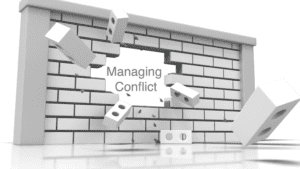Handling conflict when it revolves around inclusion
Unmanaged or poorly managed conflict can have a significant impact on your business.
According to a report released by Acas, the cost of conflict in the UK alone amounts to £28.5 billion per year. However, the effects on individuals and the organisational culture can be even more substantial. Joanne Lockwood, an Inclusive Culture Expert and CEO of SEE Change Happen, emphasises the importance of healthy disagreement in the DE&I (Diversity, Equity, and Inclusion) world and provides valuable tips on how to handle conflict when it involves inclusion.
In the DE&I world, it is crucial to acknowledge and respect the fact that people hold different perspectives and come from diverse lived experiences. Viewing disagreements as a simple dichotomy of right versus wrong can be divisive. History has shown us that what was considered “right” in the past, such as the discrimination against Black individuals or the lack of equality for women, has evolved and changed over time. Progress requires an evolution of thinking, not just a revolutionary shift.
In cases like the conflict in Northern Ireland, resolution was achieved when all parties were willing to envision a new future and seek common ground. However, representatives must also obtain buy-in from their respective communities to ensure sustained peace. While extremist minority views may persist, they need to be contained.
Creating space for constructive conversations is essential, even if disagreements may leave some individuals dissatisfied. For instance, in the context of acceptance of transgender individuals, reaching an agreement on most issues while leaving a specific aspect, such as trans inclusion in sports, unresolved, may be a pragmatic approach. However, this can also be divisive and leave certain communities feeling excluded. Similar challenges exist in Northern Ireland, where past divisions have not been fully resolved, leading some to believe the original fight must continue.
Handling delicate DE&I subjects requires framing the discussions and potentially utilising facilitators to find a shared objective. When there is mistrust, misrepresentation, and strong emotions, skilled facilitators or negotiators can greatly aid in achieving objectives. The first step is to bring willing parties to the table.
Conflict should not be ignored, but it’s important to recognise that some arguments may not reach a practical consensus. Compromise can leave everyone feeling like they have lost something. Accepting our different starting points and protected beliefs, and letting go of past challenges, enables the creation of a shared vision for the future and facilitates navigating that vision together.
Here are some top tips on handling conflict when it revolves around inclusion:
- Share opinions without causing offense and be open to hearing others thoughts.
- Approach these conversations with respect for others’ views, lived experiences, and challenges, even if you don’t ultimately agree with their beliefs.
- Recognise your own position of privilege, as it may influence your perception and the dynamics of the conversation.
- Reflect on your reactions and understand how you respond to conflict. Identifying other factors such as stress, miscommunication, or past experiences can provide insights for future interactions.
- Set anger aside and aim for discussion and negotiation rather than fuelling conflict. Anger creates division and rarely leads to productive outcomes.
- Cultivate a company culture that values respectful opinions and establishes clear boundaries for acceptable behaviour. Referencing the company’s stance on inclusion can help set the framework for constructive conversations.
- Educate yourself and others about the differences that exist among individuals. Embrace diversity for its ability to enrich and contribute to collective growth.
- Recognise that the pursuit of victory in conflicts is not constructive. Instead, reframe conflict as an opportunity to seek resolution that benefits all parties involved.
- Consider the bigger picture, share personal stories, and focus on creating a safe and inclusive environment at work.
- Reflect on whether you are engaging in parallel conversations, where your own judgments and biases filter the information being exchanged. Genuine listening and asking questions are crucial for resolving conflicts effectively.
- Remember that mindsets can be reshaped through empathy and storytelling. It’s never too late to expand knowledge and understanding.
- If necessary, involve mediators when direct communication becomes challenging and mistrust escalates, as the damages and costs—both human and financial—can be significant.
By embracing healthy disagreement, fostering understanding, and seeking resolutions that promote inclusion, organisations can navigate conflicts in the DE&I space more effectively, benefiting both their employees and the overall culture of the organisation.

